nit 4 Having Fun期末复习课件(共31张PPT)
文档属性
| 名称 | nit 4 Having Fun期末复习课件(共31张PPT) |

|
|
| 格式 | zip | ||
| 文件大小 | 124.0KB | ||
| 资源类型 | 教案 | ||
| 版本资源 | 仁爱科普版 | ||
| 科目 | 英语 | ||
| 更新时间 | 2021-12-08 00:00:00 | ||
图片预览



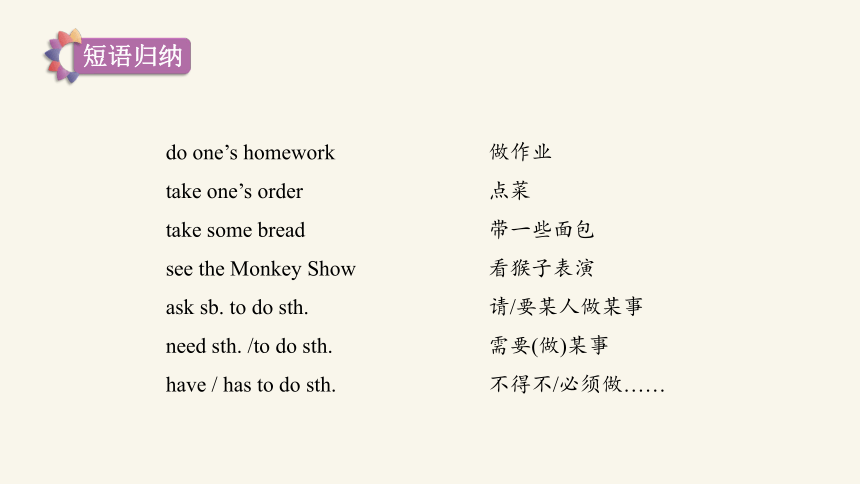
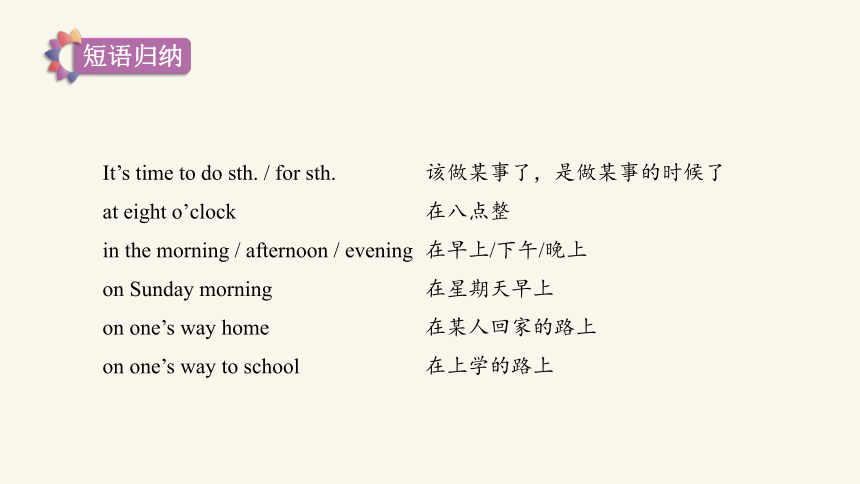
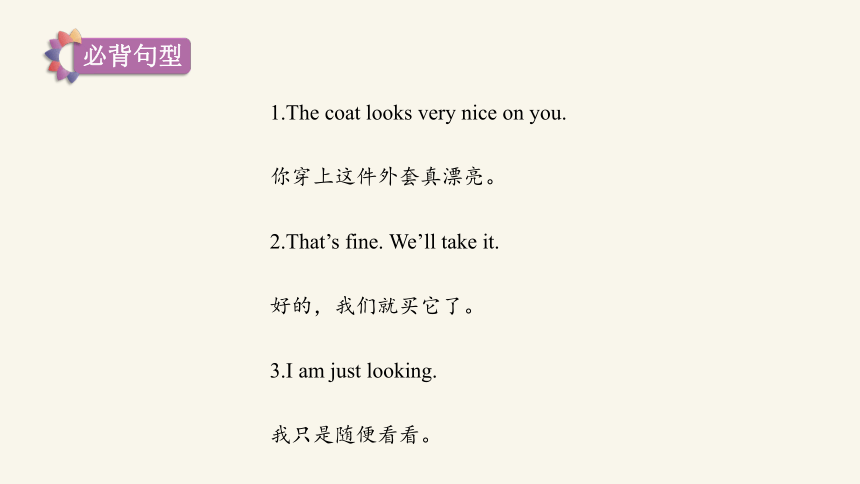
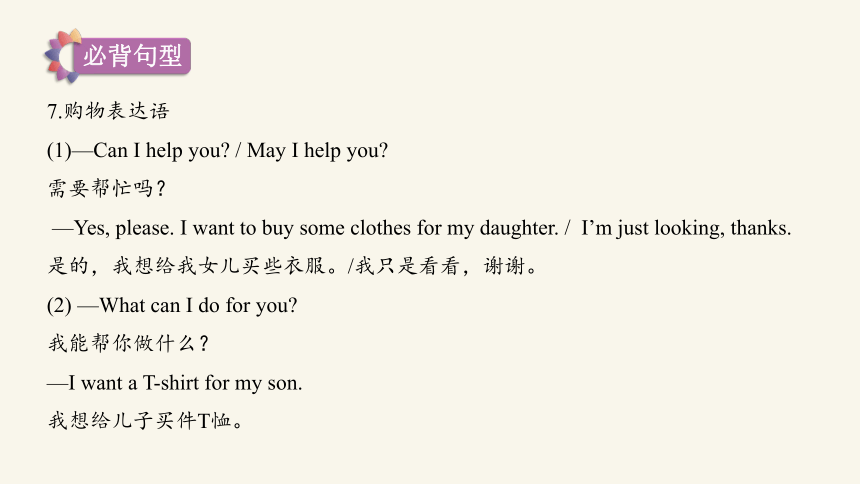
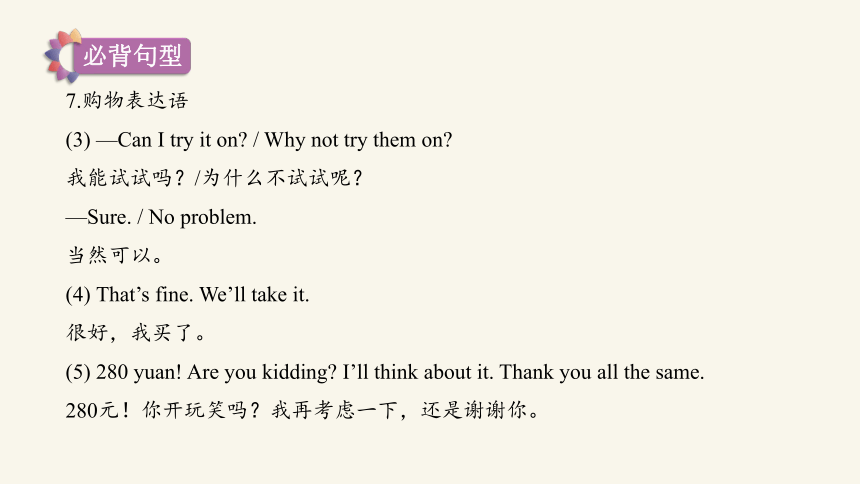
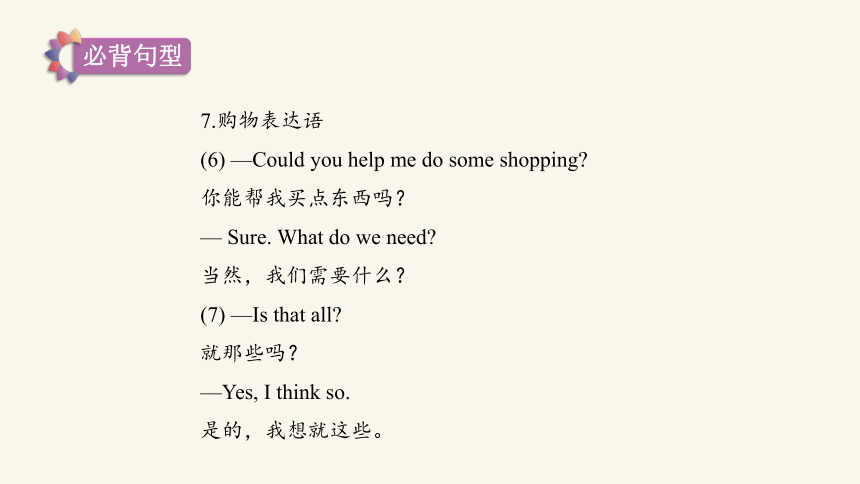
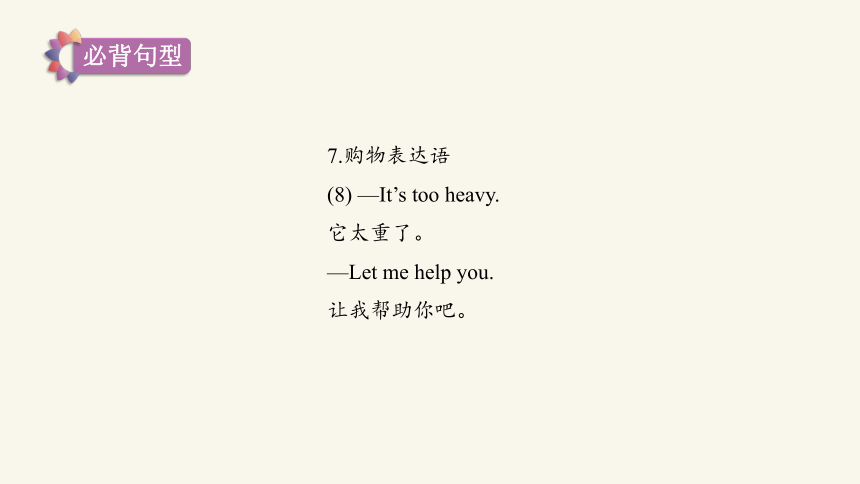
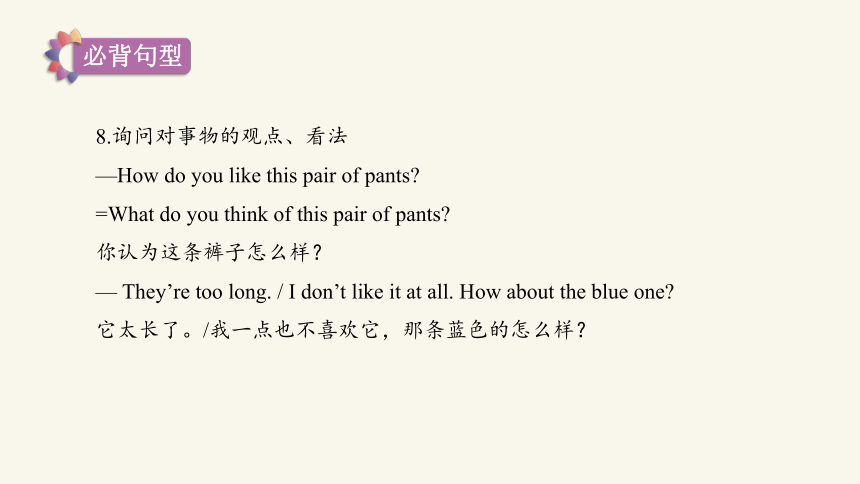
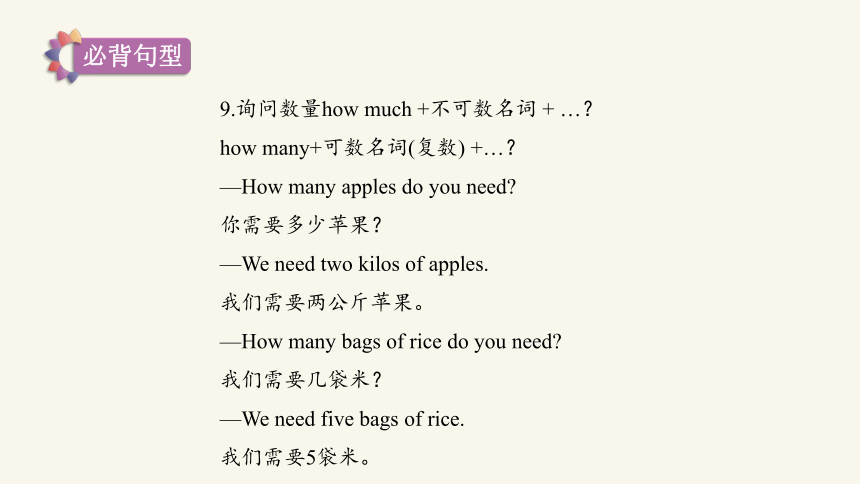
文档简介
(共31张PPT)
Unit 4 Having Fun
复习课
七年级上册
短语归纳
buy sth. for sb. = buy sb. sth. 为某人买……
try on sth.= try sth. on 试穿
think about 考虑
think of 认为
get some water 取水
fly a kite / kites 放风筝
sing some songs 唱歌
meet friends at home 在家和朋友见面
短语归纳
have a picnic=go (out) for a picnic 去野餐
get up 起床
go home 回家
go fishing 去钓鱼
go shopping=do some shopping 购物
go to the zoo 去动物园
go to the West Hill 去西山
visit a friend 拜访朋友
call … back 回电话
短语归纳
do one’s homework 做作业
take one’s order 点菜
take some bread 带一些面包
see the Monkey Show 看猴子表演
ask sb. to do sth. 请/要某人做某事
need sth. /to do sth. 需要(做)某事
have / has to do sth. 不得不/必须做……
短语归纳
It’s time to do sth. / for sth. 该做某事了,是做某事的时候了
at eight o’clock 在八点整
in the morning / afternoon / evening 在早上/下午/晚上
on Sunday morning 在星期天早上
on one’s way home 在某人回家的路上
on one’s way to school 在上学的路上
1.The coat looks very nice on you.
你穿上这件外套真漂亮。
2.That’s fine. We’ll take it.
好的,我们就买它了。
3.I am just looking.
我只是随便看看。
必背句型
7.购物表达语
(1)—Can I help you / May I help you
需要帮忙吗?
—Yes, please. I want to buy some clothes for my daughter. / I’m just looking, thanks.
是的,我想给我女儿买些衣服。/我只是看看,谢谢。
(2) —What can I do for you
我能帮你做什么?
—I want a T-shirt for my son.
我想给儿子买件T恤。
必背句型
7.购物表达语
(3) —Can I try it on / Why not try them on
我能试试吗?/为什么不试试呢?
—Sure. / No problem.
当然可以。
(4) That’s fine. We’ll take it.
很好,我买了。
(5) 280 yuan! Are you kidding I’ll think about it. Thank you all the same.
280元!你开玩笑吗?我再考虑一下,还是谢谢你。
必背句型
7.购物表达语
(6) —Could you help me do some shopping
你能帮我买点东西吗?
— Sure. What do we need
当然,我们需要什么?
(7) —Is that all
就那些吗?
—Yes, I think so.
是的,我想就这些。
必背句型
7.购物表达语
(8) —It’s too heavy.
它太重了。
—Let me help you.
让我帮助你吧。
必背句型
必背句型
8.询问对事物的观点、看法
—How do you like this pair of pants
=What do you think of this pair of pants
你认为这条裤子怎么样?
— They’re too long. / I don’t like it at all. How about the blue one
它太长了。/我一点也不喜欢它,那条蓝色的怎么样?
必背句型
9.询问数量how much +不可数名词 + …?
how many+可数名词(复数) +…?
—How many apples do you need
你需要多少苹果?
—We need two kilos of apples.
我们需要两公斤苹果。
—How many bags of rice do you need
我们需要几袋米?
—We need five bags of rice.
我们需要5袋米。
必背句型
9.询问数量how much +不可数名词 + …?
—How much rice do you need
我们需要多少米?
—We need five bags of rice.
我们需要5袋米。
必背句型
10.询问价格(price)
—How much is / are …
—It’s / They’re …
—How much is the bread
面包多少钱?
—It’s three yuan a loaf.
3块钱一条。
—How much are the shoes
这双鞋多少钱?
—They are 280 yuan.
280元。
必背句型
11.询问重量(quantity)
—How heavy is it
它多重?
— It’s one kilo a bag.
一千克一袋。
必背句型
11. 打电话的简单交际用语
(1) —Who is that, please
请问你是哪位?
—This is Sally.
我是莎莉。
(2) —May I speak to Maria
我能跟玛利亚通话吗?
—Sorry, she isn’t in/at home now.
抱歉,她不在家。
必背句型
11. 打电话的简单交际用语
(3) —Are you free this Sunday
你周日有空吗?
—Yes. What’s up
有空,什么事?
(4) —Would you like to go to the West Hill with us
你愿意跟我们一起去西山吗?
(5) —Could you ask / tell him to call me back this evening
你能请他今晚给我回电话吗?
—Sure.
当然。
必背句型
12.委婉地请求、建议
(1) —Would you like to fly a kite with me
你愿意跟我一起放风筝吗?
—Oh/Yes, I’d love/like to.
我愿意。
(2) —How/What about flying a kite with me
跟我一起放风筝怎么样?
—I’m sorry I can’t. I have to cook.
抱歉,我得做饭。
必背句型
12.委婉地请求、建议
(3) —Why not fly a kite with me
为什么不跟我一起放风筝呢?
—I’d like that, but I’m sorry I have no time.
我很乐意,但是我没时间。
(4) —Let’s fly a kite.
我们去放风筝吧。
— Good idea. / OK. / That would be very nice.
好主意。/好的。/太好了。
必背句型
13.询问时间(time)
—What time is it, please / What is the time, please
几点了?
—It’s seven o’clock.
7点了。
必背句型
14. 询问最喜欢的动物
—What are your favorite animals
你最喜欢的动物是什么?
—Elephants/Monkeys/Panadas/Tigers. They’re so/very kind/clever/cute/strong.
大象/猴子/熊猫/老虎。它们很善良/聪明/可爱/强壮。
1时间表达法
(1)直接表达:“时+分”;
e.g.4:00 four o’clock ; 12:05 twelve o five;2:30 two thirty
(2)30分钟以内:用“分+ past+ 时”,表示“几点几分”;
e.g. 8:15 a quarter past eight; 9:30 half past nine
(3)超过30分钟:用“(60-分)+ to+(时+1)”表示“差几分到几点”;
e.g. 3:55 five to four ; 5:40 twenty to six
语法点
2. some与any 的用法
some 用于肯定句及希望得到肯定回答的疑问句,any用于否定句和疑问句中。
e.g.
She wants some oranges.
Does she want any oranges
Would you like some chicken
语法点
too和very两者均可修饰形容词和副词,
too表示“过于……”;very表示“非常……”。
e.g.
The school is very nice.
The hat is too big.
词汇辨析
too 和 very
too 和either两者均表示“也”,放在句末。
但too用于肯定句,either 用于否定句。
e.g.
I like apples. My sister likes apples, too.
My father doesn’t like fish. My mother doesn’t like fish, either.
词汇辨析
too 和 either
都表示“喜欢做某事”。
like to do常指某个具体的动作,一般与would搭配表示意愿。
like doing不指某个具体的动作,意义比较抽象。
e.g.
Would you like to go fishing with me
I like going fishing on Sundays.
词汇辨析
like to do和like doing
佳作赏析
描写自己最喜欢的动物
My favorite Animal—A Dog
My favorite animal is a dog. He has nice blond hair. He is big and strong. He is cute, too. Every day, he welcomes me at home. He is very kind to me. I’m glad to see him. He is so clever. I usually take him out on Sundays. I like him very much.
同步练习
根据句意及汉语提示,完成下列句子。
1. __________ (一半) of the books on the desk are English books.
2. We can see the __________ (大象) show at nine o’clock in the morning.
3. My brother likes __________ (猴子). He says they are very clever.
4.They would like to meet at nine o’clock, but Kangkang comes one hour __________ (以后).
5. The tigers eat __________ (肉). They don’t like vegetables.
Half
elephant
monkeys
later
meat
同步练习
Wang Mei is twelve years old. She is a cute 1 . She 2 in Shanghai with her grandparents, and she is 3 No. 5 Junior High School.
Wang Mei 4 at 6:30 every morning. She has breakfast with her 5 at home. She often has some milk and bread for 6 . She goes to school at 7:30.
She 7 four classes in the morning. 8 twelve o’clock, she has lunch at school. She often goes 9 from school at 5:30. After (在……之后) dinner, she usually does 10 homework and goes to bed (上床睡觉) at 9:00.
( )1. A. boy B. girl C. woman
( )2. A. comes B. works C. lives
( )3. A. of B. on C. in
( )4. A. gets up B. get up C. getting up
( )5. A. friends B. classmates C. grandparents
( )6. A. breakfast B. lunch C. dinner
( )7. A. have B. has C. to have
( )8. A. At B. In C. On
( )9. A. to home B. home C. homes
( )10. A. she B. hers C. her
B
C
C
A
C
A
B
A
B
C
同步练习
阅读下面短文,根据中文、首字母、音标及语境提示填写所缺单词,使短文意思完整。
It’s Sunday1. /t ’ma:r /. Tom’s family are 2. f .They want to go out for 3. a /’p kn k/ on the farm.
This 4. /’i:vn /, Tom does his homework. Then he 5. (打电话) his cousin, Ben. Ben asks, “What’s 6. ” Tom asks him to go there with them.
On the 7. (路) to the farm, Tom’s father buys some apples, bananas, eggs and some juice. Tom and Ben like 8. kites, so they take two with them. His father wants to go 9. (钓鱼) there. His mother wants to sing some 10. for them. They are very happy on the farm.
tomorrow
ree
picnic
evening
calls
up
way
flying
fishing
songs
Unit 4 Having Fun
复习课
七年级上册
短语归纳
buy sth. for sb. = buy sb. sth. 为某人买……
try on sth.= try sth. on 试穿
think about 考虑
think of 认为
get some water 取水
fly a kite / kites 放风筝
sing some songs 唱歌
meet friends at home 在家和朋友见面
短语归纳
have a picnic=go (out) for a picnic 去野餐
get up 起床
go home 回家
go fishing 去钓鱼
go shopping=do some shopping 购物
go to the zoo 去动物园
go to the West Hill 去西山
visit a friend 拜访朋友
call … back 回电话
短语归纳
do one’s homework 做作业
take one’s order 点菜
take some bread 带一些面包
see the Monkey Show 看猴子表演
ask sb. to do sth. 请/要某人做某事
need sth. /to do sth. 需要(做)某事
have / has to do sth. 不得不/必须做……
短语归纳
It’s time to do sth. / for sth. 该做某事了,是做某事的时候了
at eight o’clock 在八点整
in the morning / afternoon / evening 在早上/下午/晚上
on Sunday morning 在星期天早上
on one’s way home 在某人回家的路上
on one’s way to school 在上学的路上
1.The coat looks very nice on you.
你穿上这件外套真漂亮。
2.That’s fine. We’ll take it.
好的,我们就买它了。
3.I am just looking.
我只是随便看看。
必背句型
7.购物表达语
(1)—Can I help you / May I help you
需要帮忙吗?
—Yes, please. I want to buy some clothes for my daughter. / I’m just looking, thanks.
是的,我想给我女儿买些衣服。/我只是看看,谢谢。
(2) —What can I do for you
我能帮你做什么?
—I want a T-shirt for my son.
我想给儿子买件T恤。
必背句型
7.购物表达语
(3) —Can I try it on / Why not try them on
我能试试吗?/为什么不试试呢?
—Sure. / No problem.
当然可以。
(4) That’s fine. We’ll take it.
很好,我买了。
(5) 280 yuan! Are you kidding I’ll think about it. Thank you all the same.
280元!你开玩笑吗?我再考虑一下,还是谢谢你。
必背句型
7.购物表达语
(6) —Could you help me do some shopping
你能帮我买点东西吗?
— Sure. What do we need
当然,我们需要什么?
(7) —Is that all
就那些吗?
—Yes, I think so.
是的,我想就这些。
必背句型
7.购物表达语
(8) —It’s too heavy.
它太重了。
—Let me help you.
让我帮助你吧。
必背句型
必背句型
8.询问对事物的观点、看法
—How do you like this pair of pants
=What do you think of this pair of pants
你认为这条裤子怎么样?
— They’re too long. / I don’t like it at all. How about the blue one
它太长了。/我一点也不喜欢它,那条蓝色的怎么样?
必背句型
9.询问数量how much +不可数名词 + …?
how many+可数名词(复数) +…?
—How many apples do you need
你需要多少苹果?
—We need two kilos of apples.
我们需要两公斤苹果。
—How many bags of rice do you need
我们需要几袋米?
—We need five bags of rice.
我们需要5袋米。
必背句型
9.询问数量how much +不可数名词 + …?
—How much rice do you need
我们需要多少米?
—We need five bags of rice.
我们需要5袋米。
必背句型
10.询问价格(price)
—How much is / are …
—It’s / They’re …
—How much is the bread
面包多少钱?
—It’s three yuan a loaf.
3块钱一条。
—How much are the shoes
这双鞋多少钱?
—They are 280 yuan.
280元。
必背句型
11.询问重量(quantity)
—How heavy is it
它多重?
— It’s one kilo a bag.
一千克一袋。
必背句型
11. 打电话的简单交际用语
(1) —Who is that, please
请问你是哪位?
—This is Sally.
我是莎莉。
(2) —May I speak to Maria
我能跟玛利亚通话吗?
—Sorry, she isn’t in/at home now.
抱歉,她不在家。
必背句型
11. 打电话的简单交际用语
(3) —Are you free this Sunday
你周日有空吗?
—Yes. What’s up
有空,什么事?
(4) —Would you like to go to the West Hill with us
你愿意跟我们一起去西山吗?
(5) —Could you ask / tell him to call me back this evening
你能请他今晚给我回电话吗?
—Sure.
当然。
必背句型
12.委婉地请求、建议
(1) —Would you like to fly a kite with me
你愿意跟我一起放风筝吗?
—Oh/Yes, I’d love/like to.
我愿意。
(2) —How/What about flying a kite with me
跟我一起放风筝怎么样?
—I’m sorry I can’t. I have to cook.
抱歉,我得做饭。
必背句型
12.委婉地请求、建议
(3) —Why not fly a kite with me
为什么不跟我一起放风筝呢?
—I’d like that, but I’m sorry I have no time.
我很乐意,但是我没时间。
(4) —Let’s fly a kite.
我们去放风筝吧。
— Good idea. / OK. / That would be very nice.
好主意。/好的。/太好了。
必背句型
13.询问时间(time)
—What time is it, please / What is the time, please
几点了?
—It’s seven o’clock.
7点了。
必背句型
14. 询问最喜欢的动物
—What are your favorite animals
你最喜欢的动物是什么?
—Elephants/Monkeys/Panadas/Tigers. They’re so/very kind/clever/cute/strong.
大象/猴子/熊猫/老虎。它们很善良/聪明/可爱/强壮。
1时间表达法
(1)直接表达:“时+分”;
e.g.4:00 four o’clock ; 12:05 twelve o five;2:30 two thirty
(2)30分钟以内:用“分+ past+ 时”,表示“几点几分”;
e.g. 8:15 a quarter past eight; 9:30 half past nine
(3)超过30分钟:用“(60-分)+ to+(时+1)”表示“差几分到几点”;
e.g. 3:55 five to four ; 5:40 twenty to six
语法点
2. some与any 的用法
some 用于肯定句及希望得到肯定回答的疑问句,any用于否定句和疑问句中。
e.g.
She wants some oranges.
Does she want any oranges
Would you like some chicken
语法点
too和very两者均可修饰形容词和副词,
too表示“过于……”;very表示“非常……”。
e.g.
The school is very nice.
The hat is too big.
词汇辨析
too 和 very
too 和either两者均表示“也”,放在句末。
但too用于肯定句,either 用于否定句。
e.g.
I like apples. My sister likes apples, too.
My father doesn’t like fish. My mother doesn’t like fish, either.
词汇辨析
too 和 either
都表示“喜欢做某事”。
like to do常指某个具体的动作,一般与would搭配表示意愿。
like doing不指某个具体的动作,意义比较抽象。
e.g.
Would you like to go fishing with me
I like going fishing on Sundays.
词汇辨析
like to do和like doing
佳作赏析
描写自己最喜欢的动物
My favorite Animal—A Dog
My favorite animal is a dog. He has nice blond hair. He is big and strong. He is cute, too. Every day, he welcomes me at home. He is very kind to me. I’m glad to see him. He is so clever. I usually take him out on Sundays. I like him very much.
同步练习
根据句意及汉语提示,完成下列句子。
1. __________ (一半) of the books on the desk are English books.
2. We can see the __________ (大象) show at nine o’clock in the morning.
3. My brother likes __________ (猴子). He says they are very clever.
4.They would like to meet at nine o’clock, but Kangkang comes one hour __________ (以后).
5. The tigers eat __________ (肉). They don’t like vegetables.
Half
elephant
monkeys
later
meat
同步练习
Wang Mei is twelve years old. She is a cute 1 . She 2 in Shanghai with her grandparents, and she is 3 No. 5 Junior High School.
Wang Mei 4 at 6:30 every morning. She has breakfast with her 5 at home. She often has some milk and bread for 6 . She goes to school at 7:30.
She 7 four classes in the morning. 8 twelve o’clock, she has lunch at school. She often goes 9 from school at 5:30. After (在……之后) dinner, she usually does 10 homework and goes to bed (上床睡觉) at 9:00.
( )1. A. boy B. girl C. woman
( )2. A. comes B. works C. lives
( )3. A. of B. on C. in
( )4. A. gets up B. get up C. getting up
( )5. A. friends B. classmates C. grandparents
( )6. A. breakfast B. lunch C. dinner
( )7. A. have B. has C. to have
( )8. A. At B. In C. On
( )9. A. to home B. home C. homes
( )10. A. she B. hers C. her
B
C
C
A
C
A
B
A
B
C
同步练习
阅读下面短文,根据中文、首字母、音标及语境提示填写所缺单词,使短文意思完整。
It’s Sunday1. /t ’ma:r /. Tom’s family are 2. f .They want to go out for 3. a /’p kn k/ on the farm.
This 4. /’i:vn /, Tom does his homework. Then he 5. (打电话) his cousin, Ben. Ben asks, “What’s 6. ” Tom asks him to go there with them.
On the 7. (路) to the farm, Tom’s father buys some apples, bananas, eggs and some juice. Tom and Ben like 8. kites, so they take two with them. His father wants to go 9. (钓鱼) there. His mother wants to sing some 10. for them. They are very happy on the farm.
tomorrow
ree
picnic
evening
calls
up
way
flying
fishing
songs
同课章节目录
- Unit 1 Making new friends
- Topic 1 Welcome to China!
- Topic 2 Where are you from?
- Topic 3 How old are you?
- Unit 2 Looking different
- Topic 1 I have a small nose
- Topic 2 What does she look like?
- Topic 3 Whose jacket is this?
- Unit 3 Getting togethe
- Topic 1 Does he speak Chinese?
- Topic 2 What do your parents do?
- Topic 3 What would you like to drink?
- Unit 4 Having fun
- Topic 1 What can I do for you?
- Topic 2 Would you like to cook with us?
- Topic 3 What time is it now?
